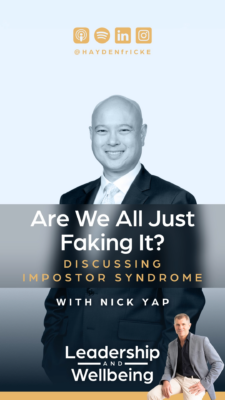Leadership and Wellbeing Podcast
Though typically, leaders are expected to be strong, tough and confident, many actually suffer from imposter syndrome, a psychological occurrence when people doubt their skills, talents, or accomplishments and have a persistent fear that they will be exposed as frauds, despite external evidence of their competencies. This can produce a lot of anxiety and negatively impact one’s ability to lead effectively. Our guest on this podcast, Nick Yap, is no stranger to this issue and as CEO of ComfortDelGro Australia, he understands the importance of prioritising his wellbeing as he leads a high-performance team of over 4,000 people.

With a Bachelor of Science degree majoring in economics, accounting and law, Singapore-born Nick has been a part of ComfortDelGro for almost 30 years. Rising through the ranks to his current CEO role in one of the largest transport companies in the world, he has experienced the many ups and downs of acting in a high-level role. In this podcast, Nick gives us a vulnerable account of what it means to navigate issues such as imposter syndrome, grief and seeking help during challenging times.
Nick shares openly about his experience of being in a dark hole during a period of uncertainty in his company. It was then that he truly understood that leadership can be lonely. Being a coaching client of mine, Nick and I talk about the work we did together to get him through, with a 360-degree review of him and his senior leadership team helping him understand that he didn’t have to go it alone. Nick’s willingness to seek professional help demonstrates the power of vulnerability and the strength in seeking support. In fact, he explains that he sees me as a coach for his mind and he asks the simple question, “we all find it normal to go to the gym and have a coach or trainer for our body, so why don’t we also have a coach for our mind?” This type of thinking helps to reduce the possible negative stigma of what seeking help is all about and it helps to normalise coaching programs. The International Coaching Federation (ICF) has shown through their research that 70% of people who receive coaching benefit from improved work performance, better relationships and more effective communication skills, amongst other key capability areas.
Working in a demanding role can often have negative impacts on our personal lives, and finding the right balance for the health of our homes isn’t always easy. Nick recognises the importance of making time for his family and describes the habits he and his wife have developed to maintain their connection and continue to be present with one another. These include being deliberate and conscious in taking time to think about and plan quality time together. For example, Nick and his wife frequently make time to go walking together. It is incredibly important for leaders to balance out their work and family commitments and aim to get the balance right as often as possible.
We discuss a particularly challenging time for Nick and his colleagues when tragedy struck within the team. Sadly, 2 of his ComfortDelGro staff were hit and killed by a car as they had stop on the side of the road to replace a tire that had punctured. He discusses the emotional impact this had on the company and the importance of supporting his team through the grieving process. Nick highlights the significance of empathy during such times, believing that true strength comes from quiet confidence and a genuine concern for the wellbeing of others.
Nick’s vulnerability and commitment to caring for those around him is a refreshing reminder that leadership and wellbeing can successfully go hand-in-hand. His story serves as a guiding light to all those who are navigating the complexities of leading others.
LINKS:
Listen and subscribe to the podcast: https://haydenfricke.com/leadership-and-wellbeing-podcast/
Book mentioned: Change Your Thinking by Sarah Edelman
Connect with Hayden:
Websites:
– https://haydenfricke.com/
– https://www.steople.com.au/
– APS College of Organisational Psychologists
